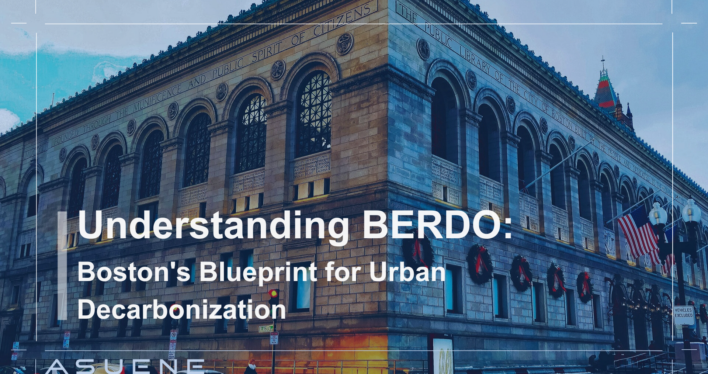- Article Summary
-
Overview
Boston’s Building Emissions Reduction and Disclosure Ordinance (BERDO), an integral initiative under Mayor Michelle Wu’s Boston Green New Deal, emerged as an ambitious strategy to reduce greenhouse gas emissions from the city’s largest buildings. Initiated in 2013 and significantly updated in 2021, BERDO mandates transparency and accountability from building owners, driving substantial reductions in energy consumption and emissions. With urban centers increasingly pivotal in global climate action, BERDO serves as a model for cities worldwide seeking robust sustainability strategies.
What is BERDO? Key Objectives and Mechanisms
BERDO targets significant emissions reductions through mandatory reporting and clearly defined reduction milestones. Essential mechanisms include:
- Annual emission reporting requirements for buildings over 20,000 square feet.
- Incremental emission reduction targets leading to carbon neutrality by 2050.
- Enforcement through financial penalties for non-compliance.
Boston’s Leadership in Global Decarbonization Efforts
BERDO has positioned Boston as a front-runner among global cities combating climate change. Comparisons with similar initiatives highlight BERDO’s distinctive strengths:
- Comprehensive and publicly accessible emission data reporting.
- Ambitious yet attainable emission reduction targets.
- Clearly outlined incentives for early compliance and strict penalties for violations.
| City | Policy | Reporting Transparency | Reduction Targets | Enforcement Rigor |
|---|---|---|---|---|
| Boston | BERDO | Public and comprehensive | Carbon neutral by 2050 | High, penalties enforced |
| New York | Local Law 97 | Public | 40% reduction by 2030 | High, significant penalties |
| London | Net Zero 2030 | Partial public reporting | Net-zero by 2030 | Moderate, incentives-focused |
| Paris | Climate Plan 2050 | Public but less detailed | Carbon neutral by 2050 | Moderate penalties and incentives |
This table illustrates Boston’s strategic advantage, especially regarding transparency and enforcement rigor.
How Can Building Owners Comply with BERDO?
Building owners can ensure effective BERDO compliance through several strategic actions:
Accurate Data Collection: Begin by systematically tracking energy and water consumption, using tools such as the ENERGY STAR Portfolio Manager. Gather historical usage data to establish a reliable baseline for emissions reporting.
Comprehensive Building Evaluations: Conduct thorough energy audits to pinpoint areas for improvement and determine how your building’s emissions align with BERDO’s standards. Use this information to identify essential efficiency upgrades.
Strategic Compliance Planning: Develop clear and achievable emission reduction goals consistent with BERDO’s roadmap toward net-zero emissions by 2050. Prioritize specific upgrades like HVAC system improvements, enhanced insulation, and energy-efficient lighting. Evaluate renewable energy options, such as installing solar panels or procuring renewable energy credits, to further offset emissions.
Engagement with Qualified Professionals: Employ certified professionals for the mandatory third-party verification of energy data, initially and every five years subsequently. Additionally, consult with energy experts to refine and implement targeted emission-reduction strategies effectively.
Utilizing Available Resources and Incentives: Leverage educational resources and support tools provided by the City of Boston to streamline compliance processes. Explore incentive programs, such as Mass Save, which offer financial assistance for energy efficiency improvements.
Staying Current with Regulations: Keep informed about critical deadlines and regularly review any updates to BERDO regulations to ensure continuous compliance and avoid potential penalties.
Challenges and Opportunities for Stakeholders
BERDO’s implementation affects diverse stakeholders, each facing distinct challenges and opportunities:
Real Estate Owners: Initial costs balanced by long-term energy savings and potential property value increases.
Businesses: Opportunities to enhance sustainability profiles, attracting eco-conscious consumers and investors.
Investors: Clear guidelines offer pathways to sustainable investment and long-term profitability.
Communities: Improved urban air quality and enhanced public health.
Case Study: 888 Boylston Street, Boston
888 Boylston Street is an exemplary case of successful BERDO compliance. Completed in 2016, this commercial building adopted cutting-edge sustainable design and technologies, including rainwater harvesting, solar panels, and high-efficiency HVAC systems. The facility was specifically designed to consume 47% less energy and cut water use by 37% compared to similar office buildings. Additionally, it was designed to reduce lighting needs by 60%, achieving significant operational cost savings and increasing tenant satisfaction. The building also achieved LEED Platinum certification, further enhancing its market value and sustainability credentials. (A Better City)

Global Implications and Future Outlook
BERDO offers a replicable model for international cities seeking impactful emissions reduction policies. Cities worldwide are increasingly looking toward Boston’s ordinance for guidance on effective urban climate strategies. As BERDO evolves, it will likely integrate more deeply with broader environmental initiatives, particularly renewable energy projects, and capitalize on technological advances to simplify compliance processes. Continuous data analysis and stakeholder feedback will inform ongoing policy adjustments, further reinforcing BERDO’s role as a dynamic and adaptive global benchmark in urban decarbonization.
Conclusion
BERDO represents a transformative advancement in urban climate action. Under Mayor Wu’s Boston Green New Deal, the city sets a precedent that global cities can emulate to accelerate the transition toward sustainable urban environments and comprehensive decarbonization. As the policy continues to mature, the collective action inspired by BERDO is expected to generate significant economic, social, and environmental benefits. The proactive involvement of stakeholders, continuous innovations in green technologies, and international cooperation will be essential to achieving global climate targets. Ultimately, Boston’s leadership with BERDO not only underscores the critical role of cities in addressing climate change but also demonstrates
Why Work with ASUENE Inc.?
Asuene is a key player in carbon accounting, offering a comprehensive platform that measures, reduces, and reports emissions, including Scope 1-3. Asuene serves over 10,000 clients worldwide, providing an all-in-one solution that integrates GHG accounting, ESG supply chain management, a Carbon Credit exchange platform, and third-party verification.
ASUENE supports companies in achieving net-zero goals through advanced technology, consulting services, and an extensive network.


